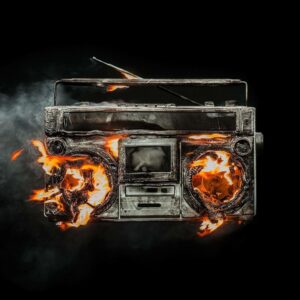Once reigning champions of the punk rock scene, Green Day experienced a few years in the early 2010s that seemed as if they had lost their divine favor. After reaching their peak with the release of the 2004 album American Idiot, the band’s subsequent arrogance and self-destruction led to a sharp decline in the eyes of critics and fans alike. The trilogy of albums released in 2012—¡Uno!, ¡Dos!, and ¡Tré!—particularly disappointed, further tarnishing Green Day’s reputation. These albums were the result of misguided and excessive ambition, for which the band paid a steep price.

Twenty years had passed since Green Day once dominated the music scene, and it seemed like they were content to be remembered as “the band that released some great albums in the past.” However, as a band, they felt the need to continue releasing albums, even if they fell short of expectations, remaining a “monster” that had to keep making statements.
Yet, even the greatest need to atone after a downfall, and Green Day sought redemption with their 2016 album Revolution Radio. While this album may not become the basis for a Broadway musical like their previous work, American Idiot(2004), it stands as their most substantial collection of songs since then. Frontman Billie Joe Armstrong described the theme of Revolution Radio as an attempt to make sense of these chaotic times, a sentiment that also reflects his own recent personal turmoil.
The album opens with “Somewhere Now,” where a sober Billie Joe asks, “How boring is the life of the wild side?” On “Still Breathing,” he likens himself to “a soldier returning home for the first time, dodging bullets and navigating a minefield.” Fortunately, sobriety didn’t dull Billie Joe’s songwriting talent; it sharpened it instead.
Revolution Radio was released in 2016, another U.S. presidential election year, much like American Idiot in 2004. Naturally, political concerns are woven into the album as well. The lead single, “Bang Bang,” with its provocative title, was inspired by the Black Lives Matter protests Billie Joe witnessed in New York and delves into the mindset of a mass shooter while also criticizing the limited media coverage of such events.
Not all the tracks are as intense as “Bang Bang,” but this kind of social commentary seems to have become something of a responsibility for Green Day. If Revolution Radio has a defining characteristic, it’s that Green Day rediscovered the joy of being themselves. While the album includes a few tracks that feel like “filler,” the sense of purpose and conciseness remains intact. “Troubled Times” comes off as somewhat heavy-handed and forgettable, while “Youngblood” unfortunately echoes the missteps of their ill-fated trilogy.
Even so, Green Day has learned that growing as a band doesn’t always mean bigger is better, and as a result, they found a way to move forward while reconnecting with their past. Revolution Radio marks an important step in the band’s journey to reclaim their musical roots and regain their former momentum. This album holds significant meaning in their career as a testament to learning from past mistakes and discovering a new musical direction.
